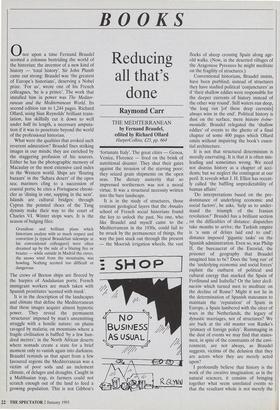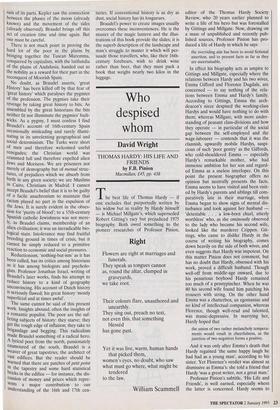BOOKS
Reducing all that's done
Raymond Carr
THE MEDITERRANEAN by Fernand Braude!, edited by Richard 011ard HarperCollins, £25, pp. 664 0 nce upon a time Fernand Braudel seemed a colossus bestriding the world of the historian; the inventor of a new kind of history — 'total history'. Sir John Plumb came out strong: Braude! was 'the greatest of Europe's historians', deserving a Nobel prize. 'For us', wrote one of his French colleagues, 'he is a prince'. The work that installed him in power was The Mediter- ranean and the Mediterranean World. Its second edition ran to 1,244 pages. Richard 011ard, using Sian Reynolds' brilliant trans- lation, has skilfully cut it down to well under half its length, a necessary amputa- tion if it was to penetrate beyond the world of the professional historian.
What were the qualities that evoked such reverent admiration? Braudel fixes striking images in our minds; they are enriched by the staggering profusion of his sources. Either he has the photographic memory of Macaulay or the most extensive card index in the Western world. Ships are 'floating bazaars' in the 'Sahara desert' of the open sea; mariners cling to a succession of coastal ports; he cites a Portuguese chroni- cler as 'dining in one, supping in the next'. Islands are cultural bridges: through Cyprus the pointed shoes of the Tang dynasty make their way to the court of Charles VI. Winter stops wars. It is the season of bulging files:
Grandiose and brilliant plans which historians analyse with so much respect and conviction [a typical Braudelian sideswipe at his conventional colleagues] were often dreamed up by the side of a blazing fire or brazier — while outside in Madrid the cierzo, the snowy 'wind from the mountains, was howling. Nothing seemed too difficult or dangerous.
The crews of Breton ships are fleeced by the harpies of Andalusian ports; French immigrant workers are much taken with Spanish prostitutes 'scented with musk'.
It is in the description of the landscapes and climate that define the Mediterranean that these images acquire almost hypnotic power. They reveal the permanent 'structures' imposed by man's unremitting struggle with a hostile nature: on plains 'ravaged by malaria; on mountains where a fragile civilisation is baffled 'by a few hun- dred metres'; in the North African deserts where nomads create a state for a brief moment only to vanish again into darkness. Braudel reminds us that apart from a few favoured regions the Mediterranean was a victim of poor soils and an inclement climate, of deluges and droughts. Caught in a Malthusian trap, its farmers could not scratch enough out of the land to feed a growing population. This is not Gibbon's 'fortunate Italy'. The great cities — Genoa, Venice, Florence — lived on the brink of nutritional disaster. They shut their gates against the invasion of the starving poor; they seized grain shipments on the open seas. The dietary austerity that so impressed northerners was not a moral virtue. It was a structural necessity written into the bare landscape.
It is in the study of structures, those resistant geological layers that the Annales school of French social historians found the key to unlock the past. No one, who like Braudel and myself came to the Mediterranean in the 1930s, could fail to be struck by the permanence of things, the way the past stuck out through the present — the Moorish irrigation wheels, the vast flocks of sheep crossing Spain along age- old walks. (Now, in the deserted villages of the Aragonese Pyrenees he might meditate on the fragility of structures.) Conventional historians, Braudel insists, have been purblind; instead of structures they have studied political 'conjunctures' as if 'their shallow eddies were responsible for the deeper currents of history instead of the other way round'. Still waters run deep, 'the long run [of these deep currents] always wins in the end'. Political history is dust on the surface, mere histoire evene- mentielle. Braude] relegated the 'shallow eddies' of events to the ghetto of a final chapter of some 400 pages which 011ard omits without impairing the book's essen- tial architecture.
It is not that structural determinism is morally enervating. It is that it is often mis- leading and sometimes wrong. We need not dismiss history as a chapter of acci- dents; but we neglect the contingent at our peril. It reveals what J. H. Elliot has recent- ly called 'the baffling unpredictability of human affairs'.
'Do interpretations based on the pre- dominance of underlying economic and social factors', he asks, 'help us to under- stand the triumph of the Iranian revolution?' Braudel has a brilliant section , on the difficulties of distance: dispatches take months to arrive; the Turkish empire is 'a sum of delays laid end to end'; distance imposed 'gigantic tasks' on the Spanish administration. Even so, was Philip II, the bureaucrat of the Escorial, the prisoner of geography that Braudel imagined him to be? Does the 'long run' of the 'underlying economic and social forces' explain the outburst of political and cultural energy that marked the Spain of Ferdinand and Isabella? Or the later decli- nacion which turned men to meditate on the decline of Rome? Might it not lie in the determination of Spanish statesmen to maintain the 'reputation' of Spain in Europe, a Spain lumbered with the ulcer of wars in the Netherlands, the legacy of dynastic marriages, not of structures? We are back at the old master von Ranke's 'primacy of foreign policy'. Rummaging in the dust of events we may find that states- men, in spite of the constraints of the envi- ronment, are not always, as Braudel suggests, victims of the delusion that they are actors when they are merely acted upon?
I profoundly believe that history is the work of the creative imagination; as in the natural sciences, it consists of bringing together what seem unrelated events so that the resultant whole is not merely the sum of its parts. Kepler saw the connection between the phases of the moon (already known) and the movement of the tides (already observed). Braudel brings off this act of creation time and time again. But one must be careful.
There is not much point in proving the hard lot of the poor in the plains by bringing together the Tuscan Maremma, conquered by capitalists, with the latifundia of the plains of Andalusia, handed out to the nobility as a reward for their part in the reconquest of Moorish Spain.
No doubt, as Braudel asserts, 'great History' has been killed off by that fear of 'great history' which paralyses the pygmies of the profession. The pygmies take their revenge by taking great history to bits. As assembled by the great historians the bits neither fit nor illuminate the pygmies' baili- wicks. As a pygmy, I must confess I find Braudel's account of 16th-century Spain Occasionally misleading and rarely illumi- nating in its unrelenting geographical and social determinism. The Turks were short of men and therefore welcomed useful renegades; the Christian world was crammed full and therefore expelled alien Jews and Moriscos. We are prisoners not merely of demography but of mental struc- tures, of prejudices which we absorb from birth in any given society; we are Muslims in Cairo, Christians in Madrid. I cannot accept Braudel's belief that it is to be guilty of a facile anachronism to maintain that racism played no part in the expulsion of the Jews. It is surely evident in the obses- sion for 'purity of blood'; to a 15th-century Spanish catholic Jewishness was not mere- ly, as Braudel claims, membership of an alien civilisation; it was an ineradicable bio- logical stain. Intolerance may find fruitful breeding ground in times of crisis, but it cannot be simply reduced to a primitive reaction to economic and social pressures.
Reductionism, 'nothing-but-ism' as it has been called, has its critics among historians as it has among biologists and psycholo- gists. Professor Jonathan Israel, writing of Braudel's later works, finds his attempt to reduce history to a kind of geography unconvincing. His account of Dutch history Is seriously flawed; his great history 'mostly superficial and at times awful'.
The same cannot be said of this present work. Insights abound, often the insights of a romantic populist. The poor are the suf- fering subjects of history: they starve; they get the rough edge of inflation; they take to brigandage and begging. This radicalism made Braudel something of a radical hero. A lyrical poet from the north, passionately enamoured of the south, Braudel is a weaver of great tapestries, the architect of vast edifices. But the reader should be warned that there are patches of petit point in the tapestry and some hard statistical bricks in the edifice — for instance, the dis- cussion of money and prices which repre- sents a major contribution to our understanding of the 16th and 17th cen-
tildes. If conventional history is as dry as dust, social history has its longueurs.
Braudel's power to create images usually overcomes these inconveniences. He is the master of the magic lantern and the illus- trations of this book provide the slides; it is the superb description of the landscape and man's struggle to master it which will per- suade those travellers, who, like their 16th- century forebears, wish to drink wine rather than beer, that they must pack a book that weighs nearly two kilos in the luggage.











































 Previous page
Previous page